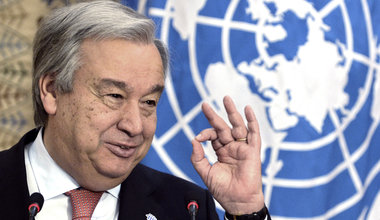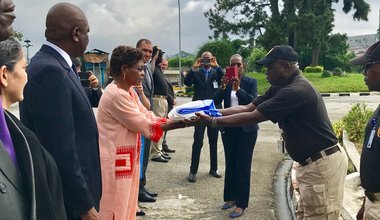Summary of UNOCI weekly press conference - Abidjan, 19 July 2012
Abidjan, 19 July 2012... The Special Representative of the United Nations Secretary-General for Côte d'Ivoire, Bert Koenders, on Wednesday, 18 July 2012, in New York, outlined the progress made in Côte d'Ivoire and the challenges that remained, during a presentation to the United Nations Security Council of the 30th Report of Secretary-General on Côte d'Ivoire.
Mr. Koenders highlighted the main progress made in Côte d'Ivoire on the road to peace, stability, development and economic revival, according to the Deputy Spokesman of the United Nations Operation in Côte d'Ivoire (UNOCI), Kenneth Blackman. However, he warned that the country continues to face difficulties and serious threats, which hinder its efforts towards the consolidation of peace, added Mr. Blackman during the Mission's weekly press conference.
Among these difficulties, he explained, the Special Representative mentioned the fact that the security situation remained unstable, in addition to other challenges such as the proliferation of arms and the presence of ex-combatants and other armed elements.
"Mr. Koenders was also worried about allegations that former Ivorian and Liberian fighters had been recruited and rearmed and attacks against the State were being prepared. He denounced the attacks against villages in the extreme west of the country, which resulted in several deaths and injuries and a large number of internally displaced persons," said the Deputy Spokesman.
During his presentation to the Security Council, the Special Representative also outlined the measures taken since the attack in June in Para, in the extreme west of Côte d'Ivoire in which seven Nigerien peacekeepers, an Ivorian soldier, and several local civilians died. Among the measures taken are the reinforcement of the military in the area by the Government, the creation of a Government commission of inquiry to which UNOCI provides technical assistance and the reinforcement of UNOCI's military presence in the west, and the intensification of collaboration between UNOCI and the UN Mission in Liberia (UNMIL).
According to Mr. Blackman, the Special Representative also stressed the need for real political dialogue in order to bring about national reconciliation. In this regard, Mr. Koenders said that a conclave, presided over by the Ivorian Prime Minister and which brought together all the opposition parties had been held and ended with the creation of a mechanism to monitor political dialogue.
The deputy spokesman said that the Special Representative had highlighted the importance of working to promote a culture of human rights in Côte d'Ivoire, as well as fighting against impunity for those who have committed human rights violations and to bring them to justice whatever their political affiliations.
Mr. Koenders also advised that the efforts to bring about security sector reform (SSR) and the disarmament, demobilisation and reintegration (DDR) process be intensified. Noting that President Alassane Ouattara had taken useful measures in this regard, the Special Representative said that UNOCI remained ready to support these efforts.
Concerning UNOCI's actions in Côte d'Ivoire, the deputy spokesman said that the Mission's Togolese battalion had destroyed 630 light weapons in its camp on 12 July 2012. "Since June 2011, UNOCI and the Commission nationale de lutte contre la prolifération des armes légères et de petit calibre (COMNAT-ALPC) had organised voluntary arms collection operations in several towns and cities in Côte d'Ivoire. To date, some 1,857 weapons have been collected and stocked in the Mission's different military bases," he added.
Turning to other matters, Mr. Blackman said that the situation in Côte d'Ivoire was calm, but remained unpredictable in the west of the country. In this regard, the level of vigilance remained high and UNOCI's contingents were ready for any eventualities. He said that ground and air patrols are being carried out with the same intensity during the day and night and that some 1,543 patrols had been carried out throughout the country. "These patrols are aimed not only at showing the presence of the force and its capacity to react to any threat against the population and their possessions but also to guarantee the free movement of people and goods, » he explained.
 ONU
ONU Nations Unies Maintien de la paix
Nations Unies Maintien de la paix



